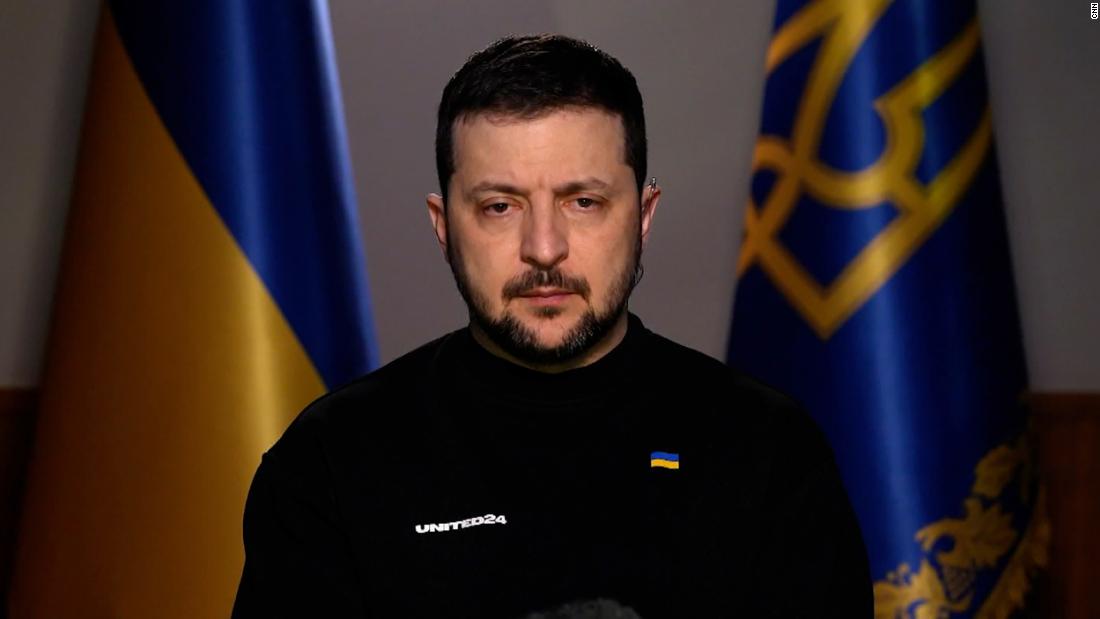
We’ve wrapped up our live coverage for the day. You can read more on Russia’s invasion of Ukraine here, or scroll through the updates below.
Leaked documents show depth of US insight into Russia’s war effort — and expose Ukrainian vulnerabilities
From CNN’s Natasha Bertrand and Kylie Atwood
Highly classified Pentagon documents leaked online in recent weeks have provided a rare window into how the US spies on allies and foes alike, deeply rattling US officials, who fear the revelations could jeopardize sensitive sources and compromise important foreign relationships.
Some of the documents, which US officials say are authentic, expose the extent of US eavesdropping on key allies, including South Korea, Israel and Ukraine.
Others reveal the degree to which the US has penetrated the Russian Ministry of Defense and the Russian mercenary organization Wagner Group, largely through intercepted communications and human sources, which could now be cut off or put in danger.
Still others divulge key weaknesses in Ukrainian weaponry, air defense, and battalion sizes and readiness at a critical point in the war, as Ukrainian forces gear up to launch a counteroffensive against the Russians – and just as the US and Ukraine have begun to develop a more mutually trusting relationship over intelligence-sharing.
Ukraine has already altered some of its military plans because of the leak, a source close to Ukrainian President Volodymyr Zelensky told CNN.
The leak has also led the Pentagon to take steps to tighten the flow of such highly sensitive documents, officials said, which are normally available on any given day to hundreds of people across the government.
Zelensky slams Russia over holiday attack that left father and daughter dead
From CNN’s Mohammed Tawfeeq in Atlanta
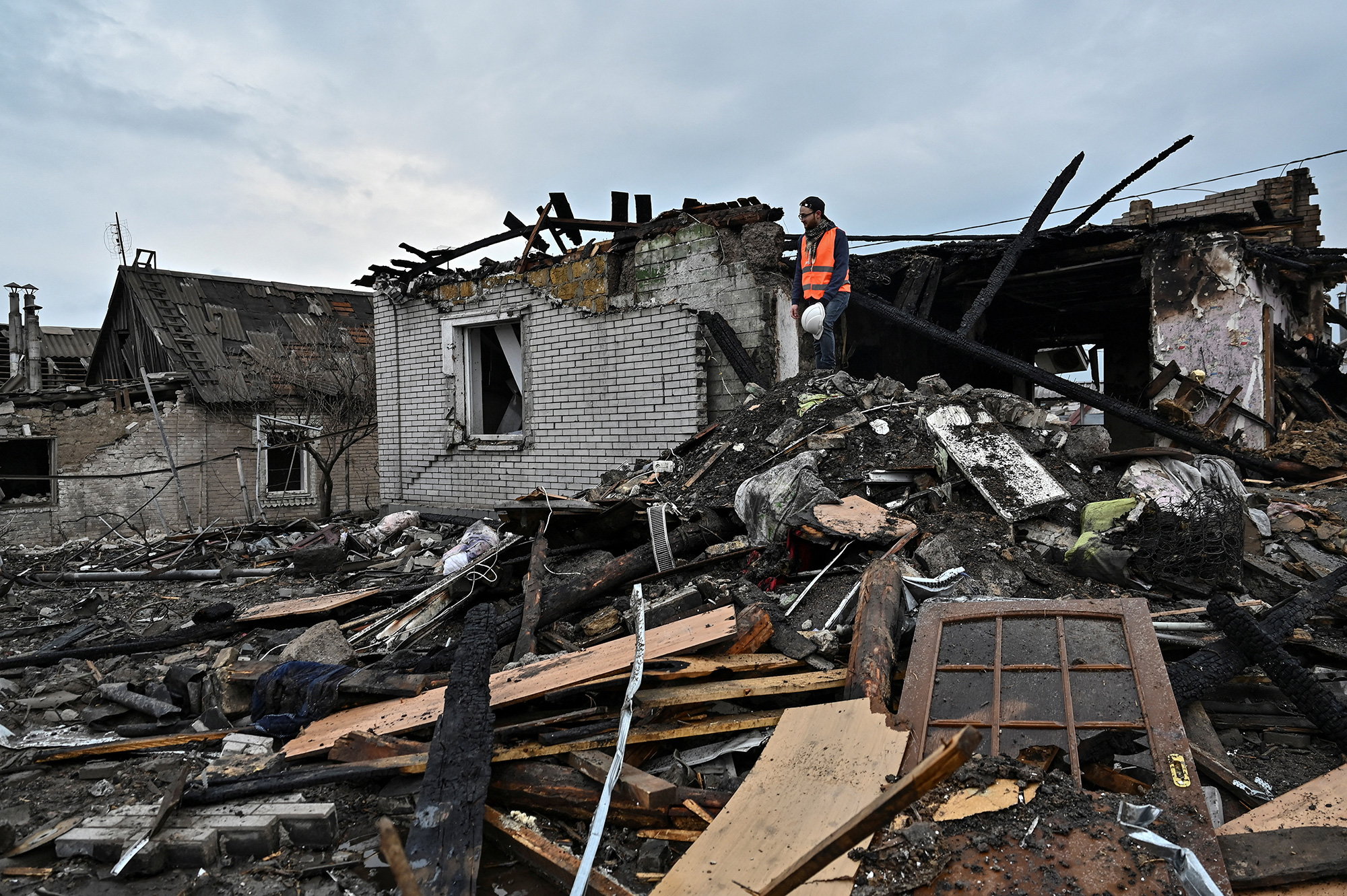
Ukrainian President Volodymyr Zelensky slammed Russia during his nightly speech Sunday for the deadly attack reported by Ukraine’s emergency service in Zaporizhzhia overnight.
“This is how the terrorist state spends this Palm Sunday,” Zelensky said, referring to today’s holiday in the eastern Orthodox tradition, as other Christians celebrate Easter Sunday.
At least two people were killed when Russian strikes hit the southern city overnight, according to Ukraine’s State Emergency Service.
A 50-year-old man and his 11-year-old daughter were killed after the strikes partially destroyed a residential building, officials said on Telegram. Rescuers pulled a 46-year-old woman out of the rubble, it added.
“This is how Russia puts itself in even greater isolation from the world, from humanity,” Zelensky said.
Ukrainians mark 1 year since train station attack killed fleeing civilians in Kramatorsk
Ukrainians marked one year Saturday since the devastating attack on a train station in the eastern city of Kramatorsk that killed dozens of people in the opening weeks of Russia’s full-scale invasion.
Residents gathered to place flowers and children’s toys at a small plaque outside the station Saturday.
Tetiana Sychchenko, who was sitting on a train at the time of the bombing but escaped with her life, told CNN she was paying respects to loved ones she lost in the attack.
The strikes killed fleeing civilians: The April 8, 2022, assault killed at least 50 people, including five children, according to Ukrainian officials.
Local police said in a statement that the rockets struck a temporary waiting room, where “hundreds of people” were waiting for trains to evacuate the besieged city.
“Russians knew that the train station in Kramatorsk was full of civilians waiting to be evacuated,” Ukrainian Foreign Minister Dmytro Kuleba said at the time, calling the attack a “deliberate slaughter.”
The Russian Ministry of Defense issued a statement shortly after the strike calling it a Ukrainian “provocation” — a statement that mirrored the Kremlin’s dismissal of allegations of war crimes in Bucha and other bombings that killed civilians during its war in Ukraine.
Life as a wartime ambassador: Oksana Markarova is Ukraine’s advocate on Capitol Hill
From CNN’s Dana Bash, Abbie Sharpe and Ann Parangot
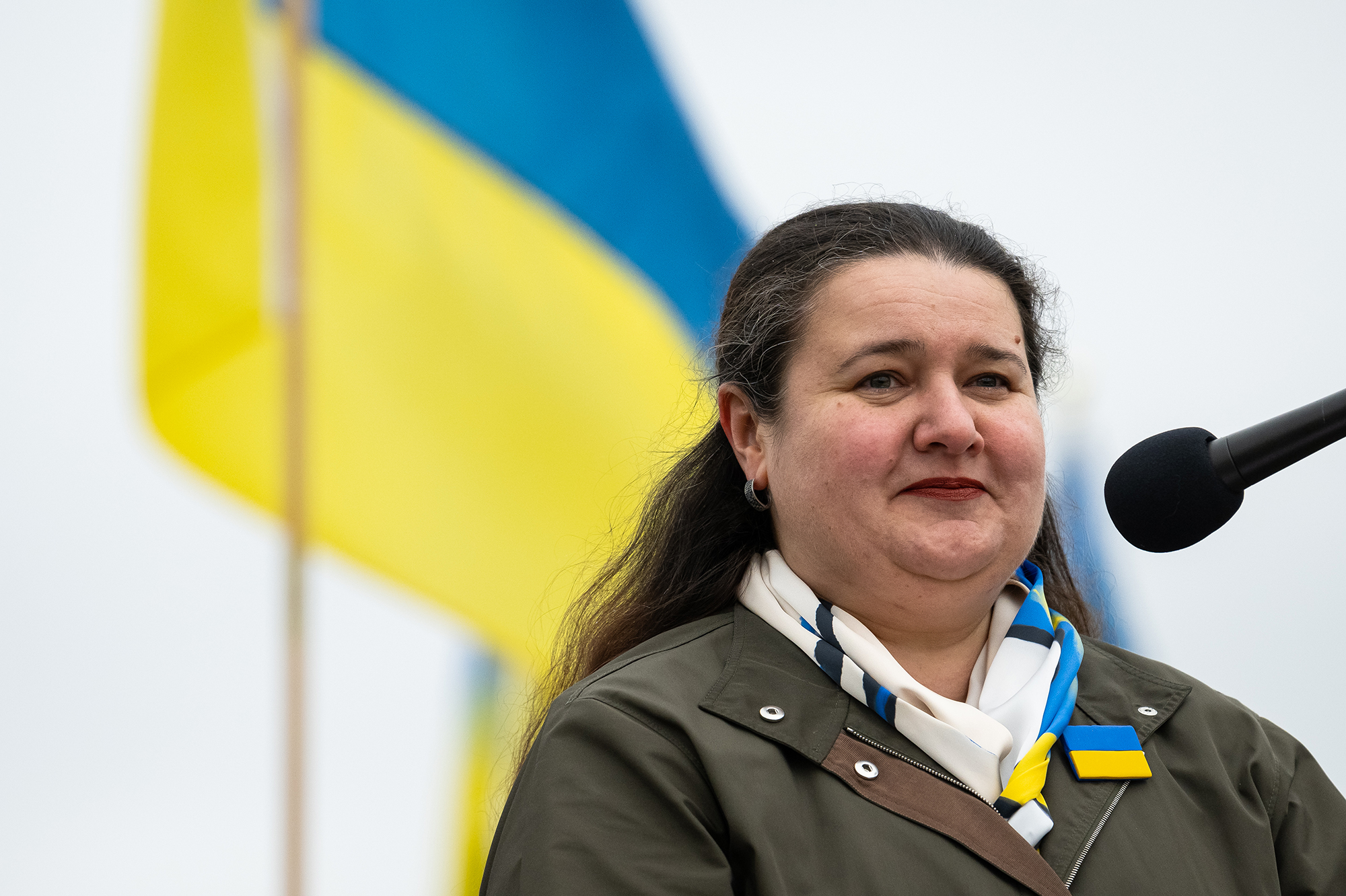
Seven-year-old Karolina plays the piano at the Ukraine House cultural center in the United States capital, poking at keys, swinging her sneakers underneath. She could be any child playing the piano — except the legs swinging below the bench are prosthetic.
Karolina lost her legs last fall in a Russian attack on the Ukrainian city of Nikopol and came to the United States to receive treatment.
Sitting with Karolina is Ukraine’s ambassador to the United States, Oksana Markarova, who helped arrange the young girl’s care.
Visits like these are now typical for the wartime ambassador.
“It’s running a marathon and just doing every day whatever you can do, in order to move our country a little bit closer to the victory,” Markarova told CNN at the Ukrainian Embassy late last month. “It’s definitely a very difficult, very demanding experience.”
This month marks two years since Markarova became ambassador. She was less than a year into her post when Russian leader Vladimir Putin invaded Ukraine on February 24, 2022.
“We were preparing for it,” she recalled. “We knew that the intent to attack us was there, but you never completely believe until, unfortunately, something horrific like war happens.”
Markarova said that for the first couple of months of the war she would wake up and wonder if it was a bad dream.
“Everyone in Ukraine, of course, it’s more difficult for them,” she acknowledged. “As I say always, the bombs are not falling on us here – but we work literally 24/7 since February 24, and we will continue working like that until we win.”
All around Washington: These days, much of Markarova’s time is spent outside the embassy, shuttling between various government agencies around Washington.
On a recent car ride from the Capitol to the Commerce Department for one of those meetings, Markarova noted the cars she uses have become “a second office.”
“This is where I prepare between the meetings, drive around everywhere,” she told CNN from the back seat.
The former private equity associate said she is not only working on securing military aid from Congress but also seeking support from American companies and entities as Ukraine begins rebuilding.
While House Republicans are divided over helping Ukraine, Markarova said she doesn’t see a difference with the chamber’s new GOP majority. She conceded, however, that there are members she has to “talk to more.”
Markarova hopes the burgeoning political debate will not weaken support overall.
“It’s hell in Bakhmut” but Kyiv’s forces are still holding positions, Ukrainian fighter says
From CNN’s Radina Gigova and Maria Kostenko
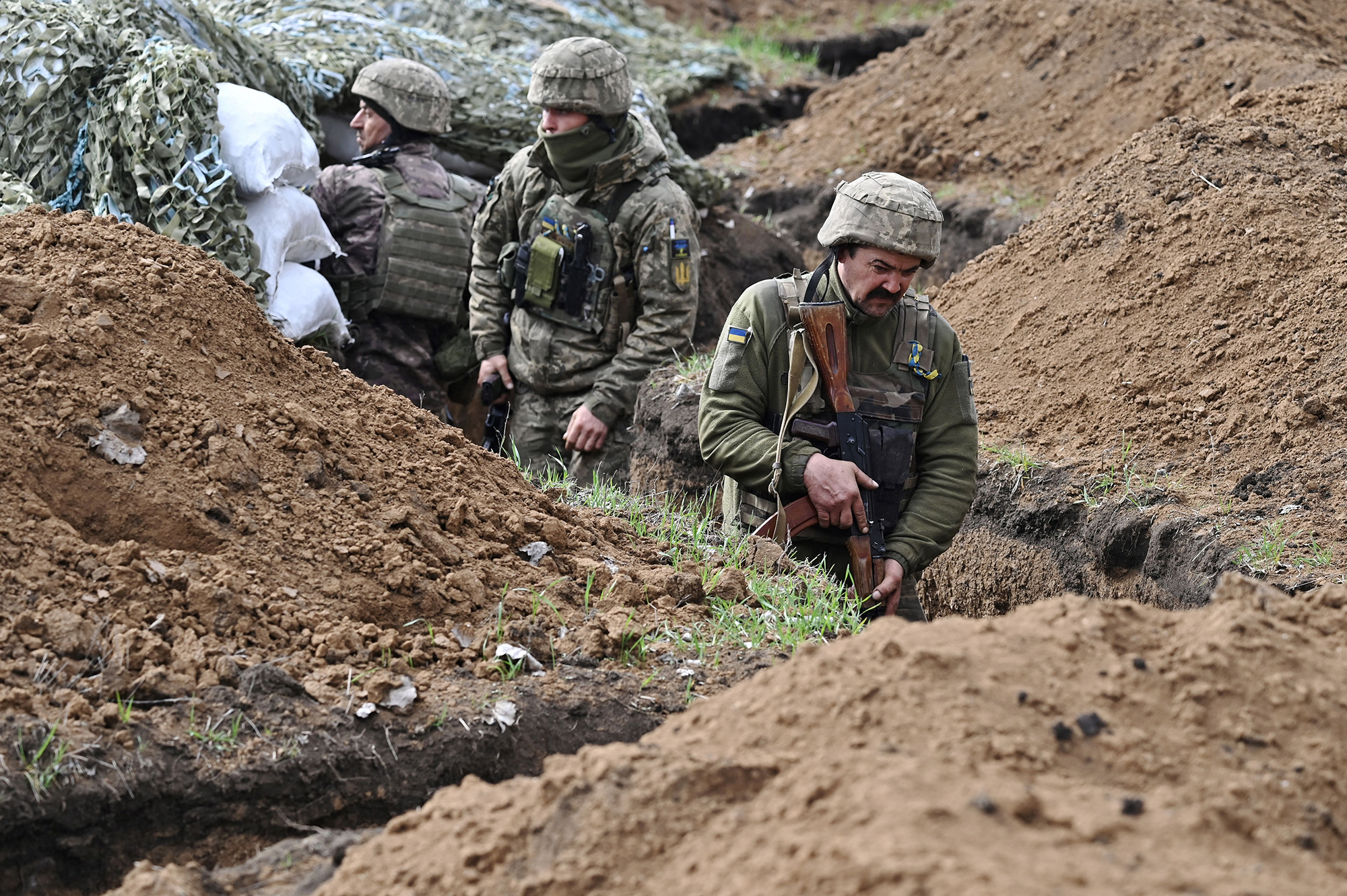
The battles inside the eastern town of Bakhmut, Ukraine, are “the most difficult ones since you are very close to the enemy,” Serhiy Cherevaty, a spokesperson for the Eastern Grouping of the Ukrainian Armed Forces, said on national television Sunday.
“But the supply route is still open and Ukrainian forces are holding their positions,” he said.
Wagner mercenary fighters have been “the most aggressive in the Bakhmut direction” but Russian paratroopers and infantry soldiers are also fighting in Bakhmut and in the area, he said. “Russians still hold a significant advantage in artillery in the areas of their main attack,” he said.
“We are supplying Bakhmut with ammunition, food and supplies, as well as taking our wounded out,” Cherevaty, said.
Moscow’s recent push: Russian forces continue their push to take “full control” of Bakhmut, the Ukrainian military said in its latest operational update Sunday morning.
Unofficial reports suggest Russian forces are maintaining their slow advance through the center of Bakhmut and into the western parts of the city, with the railway station as a potential next key target.
Yuriy Syrotyuk, a grenade launcher in Ukraine’s military, said in an interview on national television Sunday that the situation in Bakhmut is “really hard” for Kyiv’s forces, as they are outnumbered by Russian troops and Wagner fighters.
“Bakhmut stands; there is a supply” but “Russians outnumber us and hold more ammunition,” Syrotyuk said.
“It’s hell in Bakhmut. We are currently holding the right flank of the city’s defense. The enemy artillery is shooting non-stop, as well as (multiple rocket launcher fire) and aviation,” he said.
“It is really hard now because Russian artillery and tanks have pulled up very close, they are trying to shoot everything. (Enemy) paratroopers with weapons have arrived. Unfortunately, the enemy is fine with weapons. In Bakhmut they have no shortage of personnel or ammunition,” he added.
The Russian offensive on the southern flank of the city has weakened, “which is why they are trying to attack head-on through the city,” Syrotyuk said. Russia has moved its artillery and rocket launchers within the city’s boundaries.
“The enemy is destroying everything and proceeding through the ruins,” but the supply road to Bakhmut is open, Syrotyuk said.
“I was on the southern outskirts of Bakhmut this morning. We left OK. Yes, the enemy is shelling the road, yes it is dangerous. However, there are supplies, the defense is properly organized and there is even a rotation. Look, we were able to leave, to wash up, and will come back,” he added, noting he had taken a brief break from the fighting to rest and participate in the interview.
European farmers protest the impact of Ukraine’s cheap grain imports
From CNN’s Christian Edwards
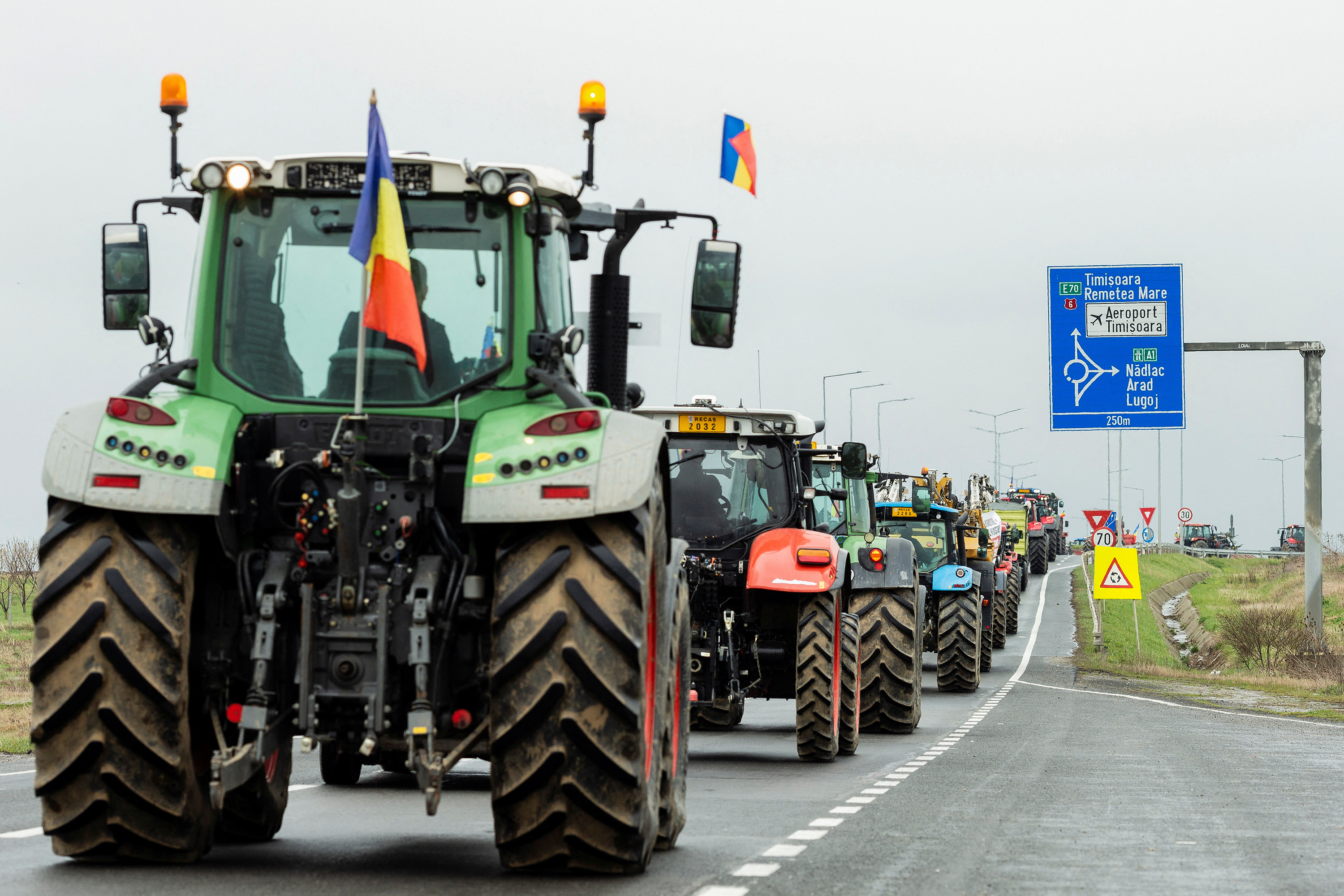
Farmers in central and eastern Europe protested this week against the impact of cheap Ukrainian grain imports, which have undercut domestic prices and hit the sales of local producers.
Protesters blocked traffic and border checkpoints with tractors along the border between Romania and Bulgaria in an effort to prevent Ukrainian trucks from entering their country, according to local news outlets.
Local producers say they cannot compete with the price of Ukrainian grain and have demanded compensation from the European Commission.
What led to the tensions: Ukraine, often called the “breadbasket of Europe” due to the vast quantities of grain it produces, had its Black Sea ports blockaded by Russia following the launch of its full-scale invasion in February 2022.
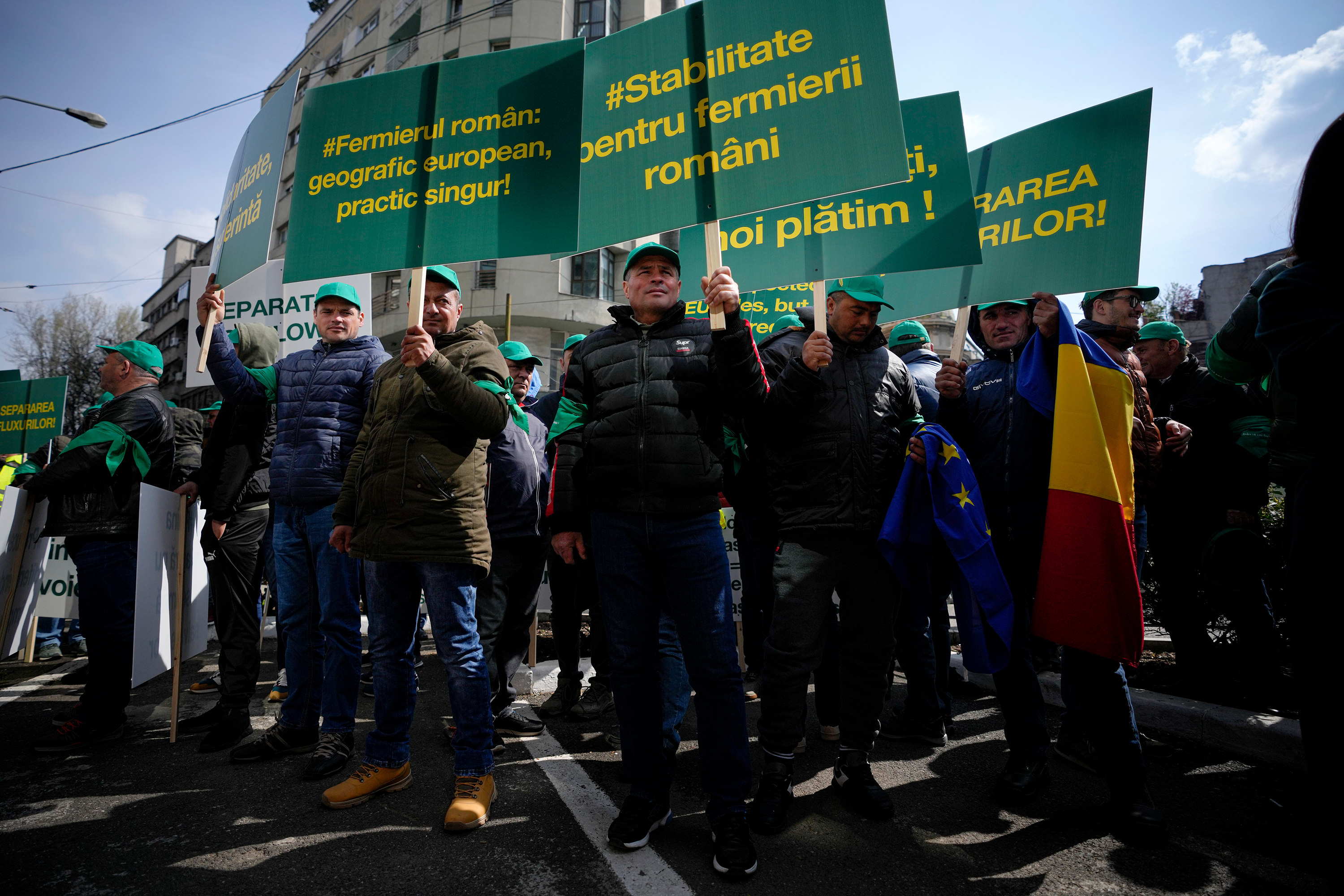
Fearing the situation was “threatening global food security,” the European Commission set up what it called “solidarity lanes” in May to facilitate exports.
The Commission also temporarily eliminated all duties and quotas on Ukraine’s exports, allowing a glut of cheap Ukrainian grain to flow into Europe.
This has caused “huge market distortions” in neighboring countries, according to European farmers’ association Copa-Cogeca.
Plans for an extension: Anger grew this week after the European Commission announced a draft decision to extend duty-free and quota-free imports of Ukrainian grain until June 2024, prompting Polish agriculture minister Henryk Kowalcyzk to resign from his post Wednesday.
In Kowalczyk’s resignation statement, he said that the Polish government – along with those of Slovakia, Romania, Hungary and Bulgaria – had submitted a request to the European Commission to “activate the protection clause in the field of duty-free and quota-free imports of grain from Ukraine.”
“Bulgaria is in solidarity with Ukraine, but a local glut is being created on the agricultural market, because instead of export corridors our countries are becoming warehouses,” Bulgaria’s agriculture minister Yavor Gechev said.
Elderly Ukrainians and their pets stay put in the abandoned east
From CNN’s Ben Wedeman in Kostiantynivka
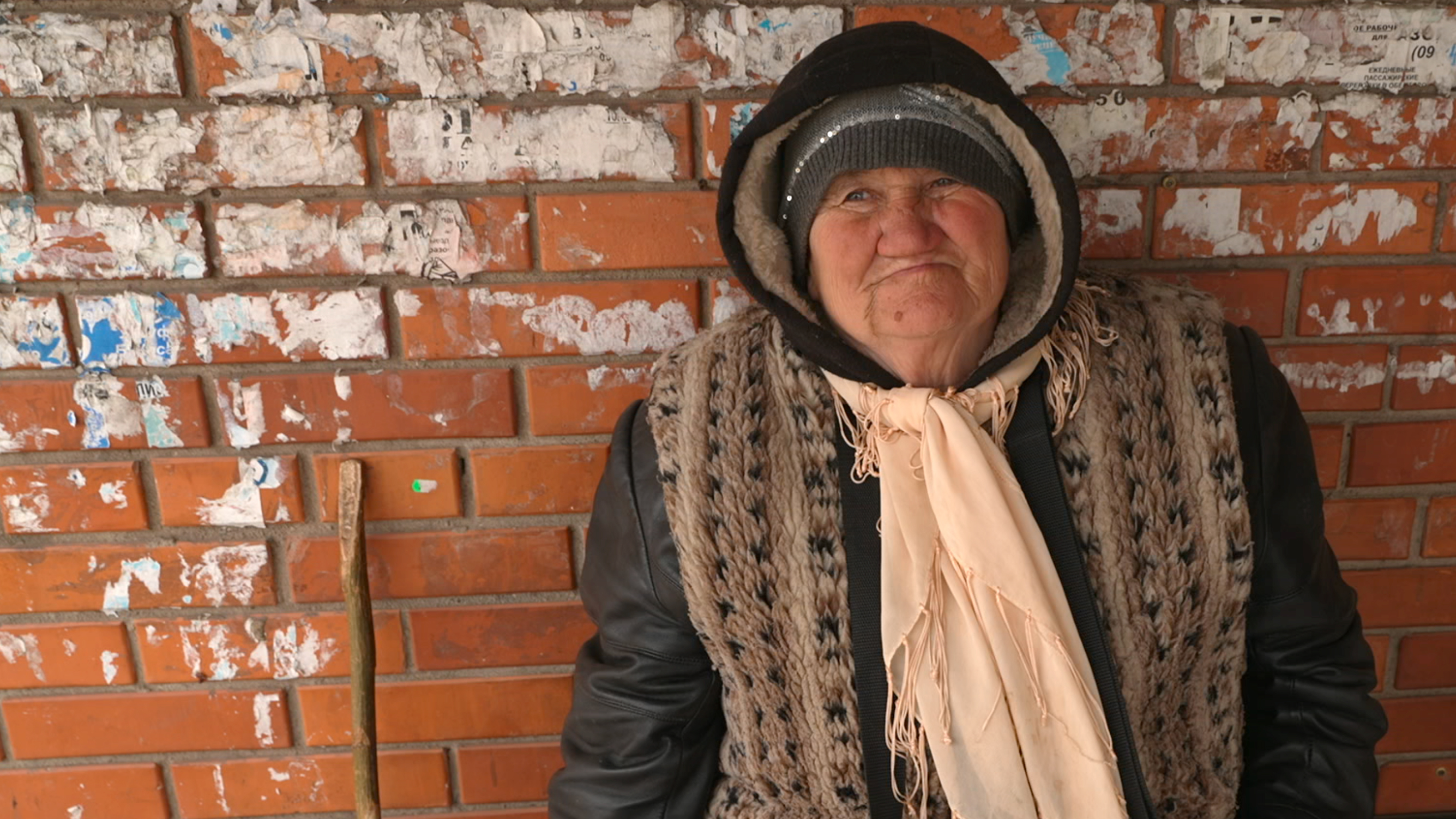
Few days pass in eastern Ukraine’s Kostiantynivka without the sound of missiles.
As the fighting in Bakhmut rages on — the battle has been going on for more than seven months — Russian shells and missiles often land in towns well away from the front lines.
Kostiantynivka is one of those towns. What passes for normal life is a thing of the past here. Many of the windows in its houses and apartment buildings have been blown out. Remaining residents nail plastic sheeting to the window frames to keep out the cold.
The towns and villages close to the fighting are largely abandoned. But in Kostiantynivka, some residents have remained.
As she waits for the bus, Tamara crosses herself. “God protects me,” she says.
She is 73 years old, and has lived in the same flat in Kostiantynivka for the past 40 years. Her husband died long ago. Now, it’s just her and her cat.
For those who have stayed in Kostiantynivka, their pets are helping to keep them sane.
In the courtyard of a crumbling Soviet-era block, Nina, 72, surveys the wreckage around her.
I’m on the last breath of survival. I’m on the verge of needing a psychiatrist.
One source of relief is her flat mates — five dogs and two cats.
Pope Francis prays for Ukrainians and Russians ensnared in conflict
From CNN’s Delia Gallagher in Rome
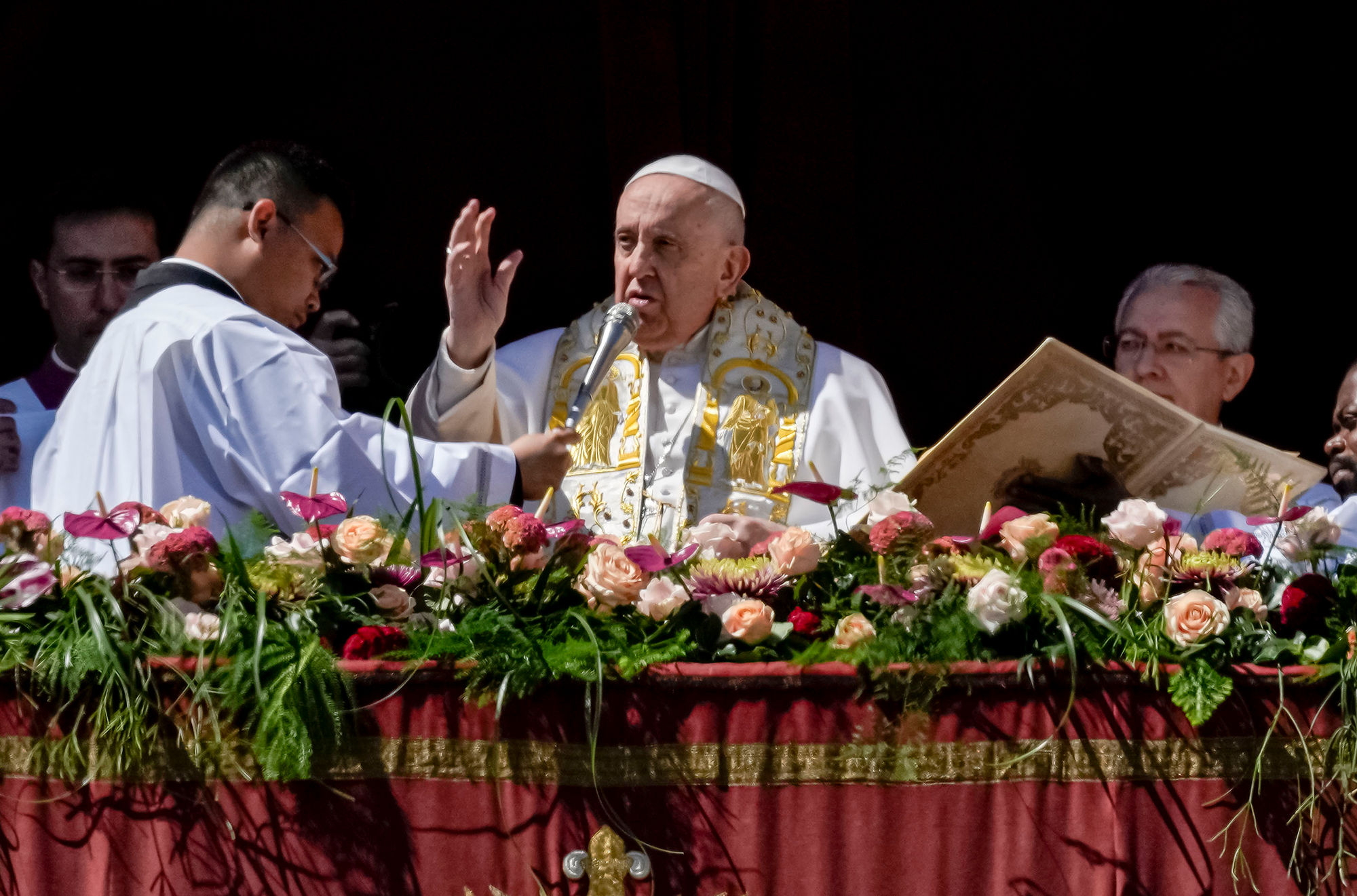
Pope Francis prayed for the people of Ukraine, Russia and other countries in conflict during his Easter blessing on Sunday from the balcony of St. Peter’s Basilica.
“Help the beloved Ukrainian people on their journey towards peace, and shed the light of Easter upon the people of Russia,” Francis said during the traditional Urbi et Orbi Blessing (“To the City and the World”).
Comfort the wounded and all those who have lost loved ones because of the war, and grant that prisoners may return safe and sound to their families.
Francis also referenced the recent clashes in Jerusalem and prayed for a “resumption of dialogue” between Israelis and Palestinians.
Nearly 100,000 people were present in St. Peter’s Square and surrounding streets for the Easter blessing, according to the Vatican Press Office.
